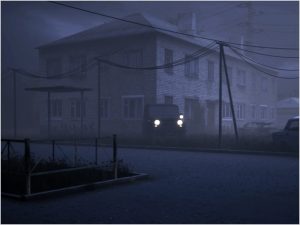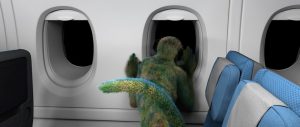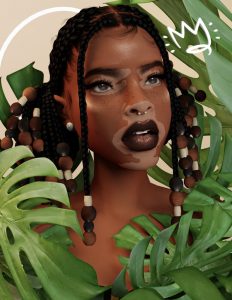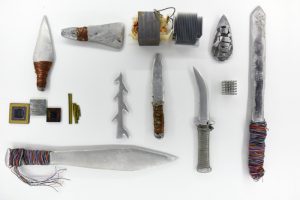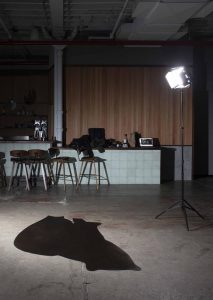Anna Dumitriu is the Director of the Institute of Unnecessary Research and an artist whose work is deeply grounded into scientific research. I met her a few weeks ago at the Mobile Music Workshop in Amsterdam where she was presenting Bio-Tracking, a mobile phone based exhibition using GPS and a software called Socialight which enabled the placement of virtual sticky notes around various locations in Brighton.

Anna sampled various locations in the city for bacteria and moulds, revealing this unseen world to us through digital micrographs. Luciana Haill, Ian Helliwell Ollie Glass and Juliet Kac created a series of sound works to accompany the images. Microbiologist John Paul wrote scientific text descriptions of the microbes.
The use of GPS, to map the locations where the microbiological swabs were taken, brought together the microscopic and the macroscopic, drawing a thread between the satellites orbiting the earth and the bacteria at our feet.
Visitors could download the software and wander around the sites receiving SMS, sound files and images to their phones. Due to the nature of Socialight the exhibition is still live and can be viewed now.
I was so impressed by Anna’s enthousiasm and the sense of poetry she brings to an invisible world which i would otherwise find as exciting as a citrus juicer that i asked her to give us more details about her work:
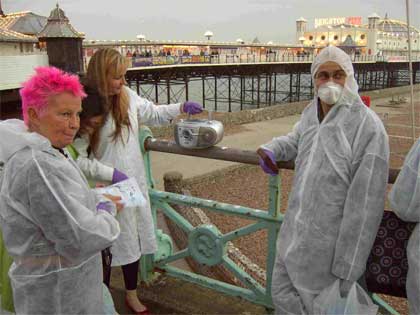 The Bio-tracking Walk Source
The Bio-tracking Walk Source
How did you get interested in bacteria?
I’ve always been fascinated with microscopic forms, I think from childhood, but about 12 years ago a key area of research for me was the notion of immortality, that led me to an interest in cell biology, looking at immortalised cell lines such as HeLa Cells and I was invited to do a short residency at St Georges Hospital in London in their Clinical Genetics lab, I became increasingly interested in the differences between our media generated notions about science and the deeper story we don’t normally get to hear about. The world of normal flora microbiology is really astonishing, to me it’s sublime, there are more bacteria on the end of your finger than there are people in the world, I can’t really get my head around that.
You told me (if i remember well) that you collaborated with scientists to develop your project. How do you think they perceive your work? Were they interested in your experiments?
Microbiologists seem to love my work because I am studying the things that they don’t get to study. You don’t become a microbiologist without the same fascination that I have for the microbial world but because of funding and other restrictions they aren’t able to study the normal flora. Clinical Microbiology studies that 1% or so of bacteria that can make us ill, the ones I study are considered to be ‘of no commercial or medical interest’, it’s the needle in a haystack thing, there might be something in that haystack worth looking scientifically at but you’d have to go through a huge amount of hay first, it won’t produce the quick results or the scientific papers needed to secure funding.
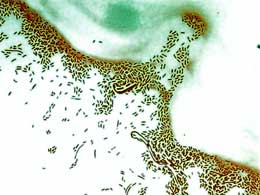 Epistemologically it’s an interesting issue, where do we draw the line about what is studied? Money draws that line. But art is judged in other ways by funders, a questioning of our epistemology can be an important issue, the aesthetics of the work, the way the public is engaged is important (in terms of Arts Council England who fund alot of my work), so I can be funded to look at this area as an artist. In terms of scientific support I’ve been working with Eastbourne District General Hospital (through Arts in Healthcare) and The Royal Sussex County Hospital in Brighton as well as a number of other collaborators and institutions. The use of digital media is also important to me (I’m looking at looking computer modelling of bacteria and artificial life technology) and I am currently Artist in Residence at The Centre for Computational Neuroscience and Robotics at Sussex University, one of the leading Artificial Life research groups in the world, which is an amazing experience.
Epistemologically it’s an interesting issue, where do we draw the line about what is studied? Money draws that line. But art is judged in other ways by funders, a questioning of our epistemology can be an important issue, the aesthetics of the work, the way the public is engaged is important (in terms of Arts Council England who fund alot of my work), so I can be funded to look at this area as an artist. In terms of scientific support I’ve been working with Eastbourne District General Hospital (through Arts in Healthcare) and The Royal Sussex County Hospital in Brighton as well as a number of other collaborators and institutions. The use of digital media is also important to me (I’m looking at looking computer modelling of bacteria and artificial life technology) and I am currently Artist in Residence at The Centre for Computational Neuroscience and Robotics at Sussex University, one of the leading Artificial Life research groups in the world, which is an amazing experience.
I should mention here that I am absolutely an artist, I don’t consider myself a scientist, or a hybrid. My relationship to science is that I would rather not collaborate (actually I am not sure if that’s entirely true), but what I mean is that I don’t feel an artist is fully able to respond to scientific information without a proper knowledge of that subject. I am very hands on, I do all my own lab work (to me it’s part of the making) and I am studying clinical microbiology as part of my (Fine Art) PhD, so rather than a superficial engagement with the concepts (a few chats with a scientist where an artist hears about some ‘cool’ ideas and goes about representing them) I’m basically trying to understand the issues and concepts from the inside and respond to them as an artist in the most informed way. There are equally valid arguements for remaining an outsider, I accept that, and interesting work is being made in that way but it’s not how I want to go about it, not something that would achieve the results I am looking for.
I feel very strongly about engaging with the widest possible audience and use my skills to get these issues and concepts out to the public, I don’t like the way that scientific language almost seems designed to be incomprehensible (or incommensurable), I believe anyone has the ability to understand anything if it is explained properly. Creating threads and networks of knowldege fascinates me, like bringing crocheters and scientists together to crochet a bed cover based on the light microscopy of the bacteria on my bed. It’s a learning curve for everyone but the results, in terms of both the personal exchanges that take place and the resulting art object it’s very worthwhile.
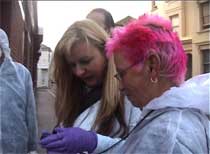
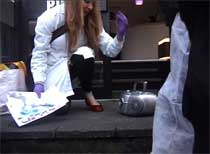 Bio-tracking: Using the GPS and Playing the sound works
Bio-tracking: Using the GPS and Playing the sound works
How much in general do you think that the science world can learn from the art world and vice-versa?
As far as I’m concerened the “claim to truth” that science has made since the Enlightenment is really now open to question. Notions of rational empiricism seem to be under attack as unachievable. The phenomenological relationship of the experimenter to the experiment is now becoming increasingly key. The ability of art to express multiple layers of meaning, from the analytical and the philosophical to the emotional makes it an ideal method to investigate knowledge within this new paradigm, acting, I believe, as a form of meta-knowledge.
Thanks Anna!

